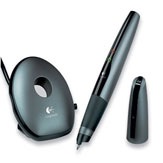Logitech IO2 Pen - .NET Support, Google Desktop Support, and Upcoming Article
 I really respect a company that not only releases a great product, but also updates it to include new functionality. Especially with just new software. The Logitech IO2 pen is a really cool idea. The original IO was ahead of its time, but I loved using it. I actually sold it on eBay and now use the Logitech IO2.
I really respect a company that not only releases a great product, but also updates it to include new functionality. Especially with just new software. The Logitech IO2 pen is a really cool idea. The original IO was ahead of its time, but I loved using it. I actually sold it on eBay and now use the Logitech IO2.
The new IO2 is smaller, has a longer battery life, more memory, and more importantly it's more pen-like. I recently updated from version 3.3 to 3.5 of their software and it includes very clever new technology they call "ioTags." My first thought was, hm, smart tags for a pen? This is actually cool because it works the  way my brain does. I typically cover a page in notes and then only a section of the paper needs some action - an email, a calendar appt, etc. Their tag concept has you circle a capital letter (the action, like "E" for email) and draw a vertical line down for context.
way my brain does. I typically cover a page in notes and then only a section of the paper needs some action - an email, a calendar appt, etc. Their tag concept has you circle a capital letter (the action, like "E" for email) and draw a vertical line down for context.
I also noticed that they have released a Google Desktop Search Plugin that makes their .PEN files searchable via Google's local search. It looks like Google Desktop Search is so popular that you really MUST release a filter for your file's format or you'll be left out in the cold. All the better for the user.
Not only that, but they have a .NET SDK available to extend the pen! It's been on my queue for a while, so long in fact that it's embarrassing.
I'm writing an upcoming article for MSDN's Coding4Fun where I extend the IO2 Pen with direct support for blog posts from the pen. I hit a snag with all the .NET 2.0 betas on my system, but I'm back in business. What better combination but blogging and a digital pen?
IDEA: Can we extend PocketMod with Anoto paper/pattern support for pens like the IO?
About Scott
Scott Hanselman is a former professor, former Chief Architect in finance, now speaker, consultant, father, diabetic, and Microsoft employee. He is a failed stand-up comic, a cornrower, and a book author.
About Newsletter




